Hilarious film about one of the greatest cartoonists who have been in this country. Vazquez was indeed a genius, though I will not fit into the temptation of a fan or some scholars say that the cartoon was the best Spanish comic artist, because it is a statement that means nothing. What do I have clear is that had the most grace. Especially during his last period, when he worked for Glénat wildest doing comics and generally for adults.
It was not until I read these stories and an interview I learned that the artist was really a defaulter as depicted in the cartoons and not only that, but also was a whoremonger and some scoundrel. Regardless of what one may think about the morality of these issues also always gave signs of being a nice guy and inspired by their answers.
The film by Oscar Aibar could create some suspicion by being led by someone from the less erratic career, starring an actor somewhat limited and blatantly commercial as Santiago Segura. Fear dissipates quickly to see the movie, Segura is gorgeous and I'm with Bootes, but does Vazquez de Torrente. Torrente is a character with less virtue, yet, the protagonist of this film, and with less wit and sympathy. Seconded Enrique Segura and Alex Angulo Villén doing some excellent performances, especially the latter, surprising in a role that is rarely used (usually it's up to the good guy).
It is said that does not work as comedy or drama should be. I think it works well as comedy in the first two thirds and includes enough drama in the past, although the pace down a little-not much-recovering in a great and moving epilogue that makes you leave the cinema with a smile on mouth. I also love "American Splendor", and I think this movie owes much to that, but I feel good that there is more humor here, as this man did comics humor and Harvey Pekar not.
Also the movie is a romantic view on the character from admiration, like most biopics, but I do not only dedicated to exalt. Rather, it presents the conflict between being a "good man" (a term that deeply hated Vazquez) or be a playboy, and presents the positive and negative consequences of both ways of seeing life.
In short, is a remarkable film. May fall into some excess (music, sound effects too caricatured certain times), but overall is a dynamic comedy, light without being entirely superficial, original, well acted and set, and, above all, a fitting tribute to a author does not adequately recognized.
Finally, I wanted to record something that has bothered me about this movie. It turns out that a guy with criteria bother to write a script rather than breaded, a producer spends his good hard to give a generous technical bill and hire one of the few Spanish actors with real charisma. Choosing a genuinely indigenous history and counted in a friendly, finding the right tone and without screwing up with the usual anachronisms, bothering to capture the mindset of the time. In other words, the kind of film we need to do, appealing to the public, with high quality and fully own idiosyncrasies.
The Great Vazquez
 Posted : 13 years, 2 months ago on 29 February 2012 02:48
(A review of El Gran Vázquez)
Posted : 13 years, 2 months ago on 29 February 2012 02:48
(A review of El Gran Vázquez) 0 comments, Reply to this entry
0 comments, Reply to this entry
The Bothersome Man
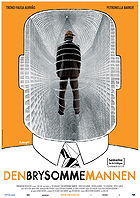 Posted : 13 years, 2 months ago on 29 February 2012 02:41
(A review of The Bothersome Man)
Posted : 13 years, 2 months ago on 29 February 2012 02:41
(A review of The Bothersome Man)The film's main idea is to forget the simple pleasures of being human, to create a surreal wonder where we are offered a perfect society where everyone should have everything you need, but paying a high price, never again enjoy the taste of good coffee, the smell of fresh bread, the rewards of an innovative conversation, the pleasure of orgasm, the fact of being fortunate to live so.
The Bothersome Man (2006) is a disturbing film mixture of what might be called Nordic comedy (if it exists or can be called current) and deep reflection on happiness and the suppression of customs grayer.
From birth we are taught an idea that inevitably accompany us the rest of our lives. The rejection of the small pleasures of life.
Only during a short period of our childhood we enjoy these pleasures that life gives you free and without asking almost nothing in return. The daily goals are: eat, drink, piss, shit, enjoy the company of loved ones and watch the world around you.
The problems come at the beginning of schooling. Getting up early, start learning things begin to nurture yourself with positive or NM (Needs improvement). With eating and toileting, your life is not full. Start, quite superfluous to account to the machinery of society. At the same time, you begin to understand television and you inculcate social and aesthetic values that will accompany you for life. Need, and without knowing why, to be like almost all belong to a group, come up with something.
During childhood, and not taste the fat, ugly either, or short people or different and everything on TV because the kids are all slender, handsome, tall and identical.
The years pass, and the level of demand increase. If you are a student in high school, if you're not, to work on whatever. We have been stratified into three layers, each a "better" than the other but always demands, yes at different levels.
Anyway, the step has befallen you, your life will never be "fully satisfactory". If you are a crack in the studies, you will seek a job that requires the maximum with the stress of course. If you are less crack, half will have a job, perhaps to be comfortable and well paid, but surely you is not woman enough for you, or wish you had a more expensive car or whatever. All well, one after another, each man will always want more, always unsatisfied. No matter what you have, or where, or how, they always want something else.
So learn to enjoy the little things and as the first act, this curious and unknown Norwegian film.
The Bothersome Man (2006) is a disturbing film mixture of what might be called Nordic comedy (if it exists or can be called current) and deep reflection on happiness and the suppression of customs grayer.
From birth we are taught an idea that inevitably accompany us the rest of our lives. The rejection of the small pleasures of life.
Only during a short period of our childhood we enjoy these pleasures that life gives you free and without asking almost nothing in return. The daily goals are: eat, drink, piss, shit, enjoy the company of loved ones and watch the world around you.
The problems come at the beginning of schooling. Getting up early, start learning things begin to nurture yourself with positive or NM (Needs improvement). With eating and toileting, your life is not full. Start, quite superfluous to account to the machinery of society. At the same time, you begin to understand television and you inculcate social and aesthetic values that will accompany you for life. Need, and without knowing why, to be like almost all belong to a group, come up with something.
During childhood, and not taste the fat, ugly either, or short people or different and everything on TV because the kids are all slender, handsome, tall and identical.
The years pass, and the level of demand increase. If you are a student in high school, if you're not, to work on whatever. We have been stratified into three layers, each a "better" than the other but always demands, yes at different levels.
Anyway, the step has befallen you, your life will never be "fully satisfactory". If you are a crack in the studies, you will seek a job that requires the maximum with the stress of course. If you are less crack, half will have a job, perhaps to be comfortable and well paid, but surely you is not woman enough for you, or wish you had a more expensive car or whatever. All well, one after another, each man will always want more, always unsatisfied. No matter what you have, or where, or how, they always want something else.
So learn to enjoy the little things and as the first act, this curious and unknown Norwegian film.
 0 comments, Reply to this entry
0 comments, Reply to this entry
Departures
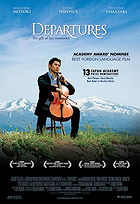 Posted : 13 years, 2 months ago on 29 February 2012 02:31
(A review of Departures)
Posted : 13 years, 2 months ago on 29 February 2012 02:31
(A review of Departures)When everyone thought that "Departures" was selected among the five finalists to win the Oscar for best foreign language film, just to meet the quota of Asian cinema, when we all were debating between 'class' and' Waltz with Bashir ', appeared Yojiro Takita's film and broke the bank. Neither the frustrating problems of French education system, not rote gaps of the Israelite nation. The Academy ended up preferring this curious mixture between life and death, between the comic and the tragic.
Although more than mixing genres, making Takita is subtly shaking with drama and comedy which are transformed into two immiscible liquids that form two almost independent. Both work really well apart (especially the first, when comes out delicious and some hooligan humor of the tape), and perhaps because of the passage from one stage to the other seems like a rather awkward period of acclimatization. Fortunately it is short, so that the film does not charge too much this transition.
What I would regret is exacerbated lyricism in some sections Nippon-tic-usual and obvious abuse of metaphors in most of the tape and something less common in Asian cinema. Among the cellist playing in hills impregnated by cherry blossoms (a scene very well shot, though) and stones, rather than representing a lost childhood, represent the obvious, unfortunately lost much of the genius displayed in sequence as suggestive as the renegade father's face blurred. The forgetfulness, denial, nostalgia, repulsion ... up together in a single image. Overwhelming lesson of synthesis, and film.
The tradition against the modern, the rural versus urban, the sensei for the student, the eternal conflict of generations, life against death. A dualism that marks the beat of this unusual journey of initiation, which is-excuse-tribute wonderful, loving vision or an endangered profession. Prepare the dead body for your trip to another world is something hypnotic (and there are the end credit titles to prove it). The concept of respect has a new meaning to see the young Daigo carefully dress the deceased. One way to make life a priori somewhat controversial, but undeniably honest and beautiful.
With a successful interpretations (especially Masahiro Motoki and Tsutomu Yamazaki), with a soundtrack and especially notable with expert guidance and sufficient marketability, "Departures" had it all to get, as it did, the coveted Oscar statuette to the best Foreign Film.
Although more than mixing genres, making Takita is subtly shaking with drama and comedy which are transformed into two immiscible liquids that form two almost independent. Both work really well apart (especially the first, when comes out delicious and some hooligan humor of the tape), and perhaps because of the passage from one stage to the other seems like a rather awkward period of acclimatization. Fortunately it is short, so that the film does not charge too much this transition.
What I would regret is exacerbated lyricism in some sections Nippon-tic-usual and obvious abuse of metaphors in most of the tape and something less common in Asian cinema. Among the cellist playing in hills impregnated by cherry blossoms (a scene very well shot, though) and stones, rather than representing a lost childhood, represent the obvious, unfortunately lost much of the genius displayed in sequence as suggestive as the renegade father's face blurred. The forgetfulness, denial, nostalgia, repulsion ... up together in a single image. Overwhelming lesson of synthesis, and film.
The tradition against the modern, the rural versus urban, the sensei for the student, the eternal conflict of generations, life against death. A dualism that marks the beat of this unusual journey of initiation, which is-excuse-tribute wonderful, loving vision or an endangered profession. Prepare the dead body for your trip to another world is something hypnotic (and there are the end credit titles to prove it). The concept of respect has a new meaning to see the young Daigo carefully dress the deceased. One way to make life a priori somewhat controversial, but undeniably honest and beautiful.
With a successful interpretations (especially Masahiro Motoki and Tsutomu Yamazaki), with a soundtrack and especially notable with expert guidance and sufficient marketability, "Departures" had it all to get, as it did, the coveted Oscar statuette to the best Foreign Film.
 0 comments, Reply to this entry
0 comments, Reply to this entry
El embrujo de Shanghai
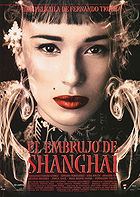 Posted : 13 years, 2 months ago on 28 February 2012 11:59
(A review of El embrujo de Shanghai)
Posted : 13 years, 2 months ago on 28 February 2012 11:59
(A review of El embrujo de Shanghai)To start with the positive, the environment in which the story unfolds is well sought after, is suggestive. The appeal of having the dreams of Shanghai with old movie aesthetic of black and white is effective. The character of Fernan-Gomez is the only credible. Not so the rest. Of course, the child protagonist is unbearable and the other not convinced at all. The situations ring false and impossible to get in, believe the story told. Nevertheless, we must read the novel by Juan Marsé, it sure is much more interesting and far-reaching in any direction. Sometimes the film has these benefits, which makes us question is what the original literature. This is no small thing.
 0 comments, Reply to this entry
0 comments, Reply to this entry
I Saw the Devil
 Posted : 13 years, 2 months ago on 28 February 2012 11:44
(A review of I Saw the Devil)
Posted : 13 years, 2 months ago on 28 February 2012 11:44
(A review of I Saw the Devil)"I Saw the Devil" tells the story of Kyung-chul, a psychopath who loves crime and the murder is an art given the diabolical and twisted methods used to end their numerous victims, all young girls. But the choice of one of them overturns his work, one of the young daughter of a retired police detective, and in the same boyfriend, also an actor, take revenge and personal goal. The clash of the titans is served.
The film does not detract from the style of great games of the genre of serial murderers, such as "Seven" or "Zodiac", but complements it with large doses of blood and bloody creativity in the modus operandi of the criminal, that might have been pupil of the legendary puzzle, villain of the saga "Saw" and seasoned with hints of black humor. This, he creates a quality film that makes the viewer travel through the roller coaster of his script and splash of blood and guts on the road, a good product but not for all tastes ... not all stomachs.
Filmed with a masterfully staged and memorable performances is a round product in a movie style and to consider and add to the short list of hits that blend a serious plot with an aesthetic and bloody gore. If anything can play against perhaps its very long duration only inviting stretch the viewer's attention more than a stretch, but the director knows recovered with surprising plot twists or visual.
The film does not detract from the style of great games of the genre of serial murderers, such as "Seven" or "Zodiac", but complements it with large doses of blood and bloody creativity in the modus operandi of the criminal, that might have been pupil of the legendary puzzle, villain of the saga "Saw" and seasoned with hints of black humor. This, he creates a quality film that makes the viewer travel through the roller coaster of his script and splash of blood and guts on the road, a good product but not for all tastes ... not all stomachs.
Filmed with a masterfully staged and memorable performances is a round product in a movie style and to consider and add to the short list of hits that blend a serious plot with an aesthetic and bloody gore. If anything can play against perhaps its very long duration only inviting stretch the viewer's attention more than a stretch, but the director knows recovered with surprising plot twists or visual.
 0 comments, Reply to this entry
0 comments, Reply to this entry
Solaris
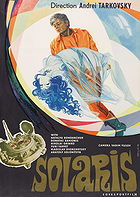 Posted : 13 years, 2 months ago on 28 February 2012 02:48
(A review of Solaris (1972))
Posted : 13 years, 2 months ago on 28 February 2012 02:48
(A review of Solaris (1972))In "Solaris" Russian director glances from the cosmos to the earth, to man. Tarkovsky does not make a trip "to infinity and beyond", but to the inner world of man. "I consider it my duty to encourage reflection on the specifically human and the eternal that lives within each of us," wrote Tarkovsky. It is no coincidence nor a matter of "resources", that special effects have been reduced to a minimum in the film, and the space station that hovers over the ocean presents a neglected aspect intelligent "home" very earthy, which presented a house whose owner is absorbed by other issues and never found the time to fix the leaky faucet or light socket ... Ironically, no other film has so many traces of Tarkovsky humanly mundane as "Solaris" (Vera Ivanova).
Tarkovsky adapted a novel by Stanislav Lem's sci-fi, and does so in his day many thought the Russian response to Kubrick's 2001. I do not think that I and my brain are prepared to say whether or not there is a relationship between these two films. It is sufficiently dense, hard, intense and interesting to also compare them. In any case, beyond science fiction, Solaris is a deep study of human nature, love and loneliness.
Solaris has, in short, the story of a man who travels to a space station to investigate the death of one of the inhabitants of the station, and look for strange phenomena that occur there.
The story presents us perfectly, in about forty minutes long, which gives us some keys to understanding what happens next. Tarkovsky's camera is accurate, but deeply cold and distant. During the next two hours we see a dense sampling of the Solaris effects in humans. Here Tarkovsky shows at times intense and at times impenetrable. I personally am interested in what I see, but I am unable to draw any conclusions about what I've seen. It's all too tight.
Solaris is almost three hours of film difficult, personal, and definitely interesting, but that challenges deeply assimilative capacity of the viewer.
Special mention, of course, the dialogues, which are essential parts of a script flawless, like all great films of Russian director (at least until "Stalker"). The world of "Solaris" is not aseptic and clean the world of "2001: A Space Odyssey" with its wide array of special effects and dazzling display of ships and flying machines (some impossible), with a striking design, convincing and realistic than almost anything you see on the screen there today...
Tarkovsky adapted a novel by Stanislav Lem's sci-fi, and does so in his day many thought the Russian response to Kubrick's 2001. I do not think that I and my brain are prepared to say whether or not there is a relationship between these two films. It is sufficiently dense, hard, intense and interesting to also compare them. In any case, beyond science fiction, Solaris is a deep study of human nature, love and loneliness.
Solaris has, in short, the story of a man who travels to a space station to investigate the death of one of the inhabitants of the station, and look for strange phenomena that occur there.
The story presents us perfectly, in about forty minutes long, which gives us some keys to understanding what happens next. Tarkovsky's camera is accurate, but deeply cold and distant. During the next two hours we see a dense sampling of the Solaris effects in humans. Here Tarkovsky shows at times intense and at times impenetrable. I personally am interested in what I see, but I am unable to draw any conclusions about what I've seen. It's all too tight.
Solaris is almost three hours of film difficult, personal, and definitely interesting, but that challenges deeply assimilative capacity of the viewer.
Special mention, of course, the dialogues, which are essential parts of a script flawless, like all great films of Russian director (at least until "Stalker"). The world of "Solaris" is not aseptic and clean the world of "2001: A Space Odyssey" with its wide array of special effects and dazzling display of ships and flying machines (some impossible), with a striking design, convincing and realistic than almost anything you see on the screen there today...
 0 comments, Reply to this entry
0 comments, Reply to this entry
House of Strangers
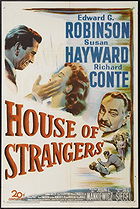 Posted : 13 years, 2 months ago on 28 February 2012 02:40
(A review of House of Strangers (1949))
Posted : 13 years, 2 months ago on 28 February 2012 02:40
(A review of House of Strangers (1949))The dramatic action takes place in NYC in the 30's and early 40. Max Monetti (Conte), a lawyer, youngest son of Italian immigrants Gino Monetti (Robinson) and Theresa (Minciotti), released from prison after serving 7 years of a conviction for attempted bribery of a jury. Remember family history in a long flashback. Pay special attention to the authoritarian and tyrannical father, and the fact that it began as a humble barber in Mulberry Street, Little Italy (NYC), and became owner of a prosperous banking company in the Lower East Side (NYC). Shows how to have trouble with the IRS because of the way to run the business, very personal, anarchic, lacking books and formalizations of loans and deposits without the mandatory contracts. It is reported by the Treasury before the courts for alleged crimes of reckless management of debt capital, usury and tax evasion. Given the possibility of being liable to a heavy fine and loss of the activity license as a banker, decided to transfer all its assets to the wife.
The short film drama, psychological drama, family drama, social drama and elements of black cinema. Gets great success and is widely imitated at the time. Shortly thereafter, Fox produced a new adaptation of the novel by Weidman in the form of western ("Broken Lance," Dmytryk, 1954). Years later, the same producer takes third screen adaptation, this time set in the world of the circus ("The Big Show", Clark, 1961).
Yordan's script includes original contributions from Mankiewicz, particularly evident in the dialogues. Ground that he made a final review of the letter, which introduced amendments. The narrative reaches high levels of drama, based on a clever sleight of inconsiderate treatment, differential treatment, envy, jealousy, excessive ambition, hatred, greed and desires for revenge. They are splendid interpretations of Robinson, Conte and Hayward. As usual in the work of Mankiewicz, the story contains ellipsis and innuendo, which lighten text, and excerpts of truffled ambiguities.
Featured are scenes interviews with the children's father in the bedroom, the dialogues of Max and Irene in the apartment, Max's interview with the three brothers in Joe's office, etc.. The soundtrack, by Daniele Amfitheatrof, provides background music jazz sax-dominated, like ribbons of black cinema. Add pieces of operas such as "Rigoletto" (Verdi) and "The Barber of Seville" (Rossini). It offers three pieces of sensual songs by Dolores Parker at the Italian restaurant ("Can not We Talk It Over"). Photography, Milton R. Krasner ("Eve," Mankiewicz, 1950), B / N, creates compositions of contrasting light, plenty of shadows and oppressive spaces.
The short film drama, psychological drama, family drama, social drama and elements of black cinema. Gets great success and is widely imitated at the time. Shortly thereafter, Fox produced a new adaptation of the novel by Weidman in the form of western ("Broken Lance," Dmytryk, 1954). Years later, the same producer takes third screen adaptation, this time set in the world of the circus ("The Big Show", Clark, 1961).
Yordan's script includes original contributions from Mankiewicz, particularly evident in the dialogues. Ground that he made a final review of the letter, which introduced amendments. The narrative reaches high levels of drama, based on a clever sleight of inconsiderate treatment, differential treatment, envy, jealousy, excessive ambition, hatred, greed and desires for revenge. They are splendid interpretations of Robinson, Conte and Hayward. As usual in the work of Mankiewicz, the story contains ellipsis and innuendo, which lighten text, and excerpts of truffled ambiguities.
Featured are scenes interviews with the children's father in the bedroom, the dialogues of Max and Irene in the apartment, Max's interview with the three brothers in Joe's office, etc.. The soundtrack, by Daniele Amfitheatrof, provides background music jazz sax-dominated, like ribbons of black cinema. Add pieces of operas such as "Rigoletto" (Verdi) and "The Barber of Seville" (Rossini). It offers three pieces of sensual songs by Dolores Parker at the Italian restaurant ("Can not We Talk It Over"). Photography, Milton R. Krasner ("Eve," Mankiewicz, 1950), B / N, creates compositions of contrasting light, plenty of shadows and oppressive spaces.
 0 comments, Reply to this entry
0 comments, Reply to this entry
Man Hunt
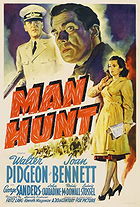 Posted : 13 years, 2 months ago on 28 February 2012 02:33
(A review of Man Hunt)
Posted : 13 years, 2 months ago on 28 February 2012 02:33
(A review of Man Hunt)Captain Alan Thorndike, a big fan of hunting, traveling to Germany in search of a new dam. After capturing all kinds of animals have in your sight to Adolf Hitler, his intention is not to kill him, but simply whether it is possible. But once there ... Now or never seem to think. Charge your weapon and when you pull the trigger ... is captured. From that moment happened to be the Thorndike hunter to prey.
If already in "The Testament of Dr. Mabuse" Fritz Lang began throwing harsh criticism against Nazism, is in "Man caught" completely when added intrigue and espionage film continuing his criticism of Hitler mingling fiction and reality with a web of homespun entertainment. At the height of World War II, Fritz Lang presents the attempted assassination of Hitler by a British man, who always pay their daring being watched and followed by the unconditional mad ruler.
With notable influences of the latest works of Hitchcock ("Special Envoy", "Sabotage"), Lang recreates a restless and rootless atmosphere in which one breathes excitement and suffering. London is altered by the entry of the Germans in Warsaw, an effect achieved by a proper black and white photography and sophisticated staging. Beyond its just passable script, Lang manages to capture the uneasy conscience of the hunter and his prey, an effect that Hitchcock achieved again in 1956 in "The Wrong Man." Regardless of its flaws (the character of Jerry is, in my view, exageradísimo, contributing to poor performance of Joan Bennett), "The man caught" is an exemplary example of the cinema of the years 30-40, but even with theatrical influences that gradually evolve into its own language. I especially liked the idea that it is not the main character as a hero (at least in the first half), but merely states Lang events objectively, leaving the viewer free opinion what happens.
The glorious black and white combined with the darkness of the misty England give us a fascinating thriller and persecution that is on par with other classics Lang. Despite its ridiculous end, I do not spoil the result is a fascinating story of spies and persecution. I do not like the scissors in the cinema but in the final epilogue, would significantly improve this excellent movie.
If already in "The Testament of Dr. Mabuse" Fritz Lang began throwing harsh criticism against Nazism, is in "Man caught" completely when added intrigue and espionage film continuing his criticism of Hitler mingling fiction and reality with a web of homespun entertainment. At the height of World War II, Fritz Lang presents the attempted assassination of Hitler by a British man, who always pay their daring being watched and followed by the unconditional mad ruler.
With notable influences of the latest works of Hitchcock ("Special Envoy", "Sabotage"), Lang recreates a restless and rootless atmosphere in which one breathes excitement and suffering. London is altered by the entry of the Germans in Warsaw, an effect achieved by a proper black and white photography and sophisticated staging. Beyond its just passable script, Lang manages to capture the uneasy conscience of the hunter and his prey, an effect that Hitchcock achieved again in 1956 in "The Wrong Man." Regardless of its flaws (the character of Jerry is, in my view, exageradísimo, contributing to poor performance of Joan Bennett), "The man caught" is an exemplary example of the cinema of the years 30-40, but even with theatrical influences that gradually evolve into its own language. I especially liked the idea that it is not the main character as a hero (at least in the first half), but merely states Lang events objectively, leaving the viewer free opinion what happens.
The glorious black and white combined with the darkness of the misty England give us a fascinating thriller and persecution that is on par with other classics Lang. Despite its ridiculous end, I do not spoil the result is a fascinating story of spies and persecution. I do not like the scissors in the cinema but in the final epilogue, would significantly improve this excellent movie.
 0 comments, Reply to this entry
0 comments, Reply to this entry
Train of Shadows (Tren de sombras, 1997)
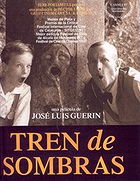 Posted : 13 years, 2 months ago on 27 February 2012 07:51
(A review of Train of Shadows)
Posted : 13 years, 2 months ago on 27 February 2012 07:51
(A review of Train of Shadows)In the text "The Kingdom of Shadows", Gorki warned that life in the cinema is but a shadow, that motion is nothing but its soundless specter, that if a train appears on screen, "is also a train that of shadows. "
"Train of Shadows" is a rather unique experiment in the history of cinema. It's film within a film, is almost a reverence to the movies. Absolutely masterful journey into the bowels of cinema emprendre Guerin. A ghost story and mystery that is revealed little by little, without the need for dialogue, only through the image, through study, dissection and the mere delight of the filmed image. It's a movie perhaps difficult, demanding, with a radical independence of the viewer, full of dead time, but the trip, I would say it is worth. It is also a difficult film to describe by words. It is a game that replaces photographs by frame, running from the still image to moving images literally shake.
Absolutely masterful journey into the bowels of cinema emprendre Guerin. Encounters with ghosts dancing in the shadows of prehistory filmic forgotten that helps us reflect on the origins of memory in its purest form. That we too will be. Film, no doubt, looks, adjustments between yesterday and today, and loneliness. This second act is filmed apotheosis where the empty house which had previously been living germ. That third act where the color creonstruye a new look to the past recovered from that family rescued in time.
"Train of Shadows" is a rather unique experiment in the history of cinema. It's film within a film, is almost a reverence to the movies. Absolutely masterful journey into the bowels of cinema emprendre Guerin. A ghost story and mystery that is revealed little by little, without the need for dialogue, only through the image, through study, dissection and the mere delight of the filmed image. It's a movie perhaps difficult, demanding, with a radical independence of the viewer, full of dead time, but the trip, I would say it is worth. It is also a difficult film to describe by words. It is a game that replaces photographs by frame, running from the still image to moving images literally shake.
Absolutely masterful journey into the bowels of cinema emprendre Guerin. Encounters with ghosts dancing in the shadows of prehistory filmic forgotten that helps us reflect on the origins of memory in its purest form. That we too will be. Film, no doubt, looks, adjustments between yesterday and today, and loneliness. This second act is filmed apotheosis where the empty house which had previously been living germ. That third act where the color creonstruye a new look to the past recovered from that family rescued in time.
 0 comments, Reply to this entry
0 comments, Reply to this entry
Eliot Ness? More or less..(The Untouchables, 1987)
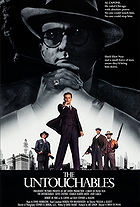 Posted : 13 years, 2 months ago on 26 February 2012 04:11
(A review of The Untouchables)
Posted : 13 years, 2 months ago on 26 February 2012 04:11
(A review of The Untouchables)Undeniably, the movie starts well, can see at least that will "hook" to create a story that seeks good entertainment. But this, laudable, nothing but pure illusion. Soon the interest is being diluted and continuing debacle unstoppable and more pronounced, progressive, as can be seen in it a no capacity to surprise. Here the plot twists and daring simply do not exist. Everything is predictable. The device begins to take shape and not a single scene that does not emphasize what is already explicit or abandon the easy condescension to mainstream audiences. The succession of absurdities or poorly resolved and is unstoppable, uninterrupted.
I did not expect such a low level of credibility, and even overall quality of "The Untouchables ..." in view of the excellent reviews it has received from its distant opening. Even the fact that it was one of the biggest losers in the corresponding year's Academy Awards, was also supposed to "offering more": a more personal and original invoice, less beholden to the Hollywood filter (more attentive to the viewer popping and commercial performance to the actual content of the film) ... After I fell so much in my view as naive in this and other "untouchables" details, marked by the industry. It is just one more film from the projected prizes, each time, less prestigious Academy. Marketing dollars and, at the end of the tour, candid entertainment. Good technical bill, but can not say the same of their narrative aspect.
If you think you are witnessing a new installment of "Superman" or "Raiders of the Lost Ark" can support the continuous licensing tragicomic scene looking stroller with child "possessed", but presumably it is parody is not a historical reenactment. Here, more than at any other time, the seriousness should be assumed. Even a buffoonish De Niro seems to laugh to the role he plays. Connery is saved and it disappears in time.
His reading is rapid, although again, too explicit, so the story does not feel, only "be seen" and increasingly, seeps telefilm, history lightly, without any historical significance and few means of argument. Does the music? better without the soundtrack. Recreation is acceptable, good atmosphere, another (perhaps the only credible if you delete the Far West of the bridge ...) but is this enough to make your vision? True, not enough to bore you but at times it becomes outrageous, I do not know which is worse.
It is unfortunate to note how far is the De Palma original and avant-garde of "The Phantom of the Paradise" or the haunting "Obsession"; "Carrie" or "Dressed to Kill."
I did not expect such a low level of credibility, and even overall quality of "The Untouchables ..." in view of the excellent reviews it has received from its distant opening. Even the fact that it was one of the biggest losers in the corresponding year's Academy Awards, was also supposed to "offering more": a more personal and original invoice, less beholden to the Hollywood filter (more attentive to the viewer popping and commercial performance to the actual content of the film) ... After I fell so much in my view as naive in this and other "untouchables" details, marked by the industry. It is just one more film from the projected prizes, each time, less prestigious Academy. Marketing dollars and, at the end of the tour, candid entertainment. Good technical bill, but can not say the same of their narrative aspect.
If you think you are witnessing a new installment of "Superman" or "Raiders of the Lost Ark" can support the continuous licensing tragicomic scene looking stroller with child "possessed", but presumably it is parody is not a historical reenactment. Here, more than at any other time, the seriousness should be assumed. Even a buffoonish De Niro seems to laugh to the role he plays. Connery is saved and it disappears in time.
His reading is rapid, although again, too explicit, so the story does not feel, only "be seen" and increasingly, seeps telefilm, history lightly, without any historical significance and few means of argument. Does the music? better without the soundtrack. Recreation is acceptable, good atmosphere, another (perhaps the only credible if you delete the Far West of the bridge ...) but is this enough to make your vision? True, not enough to bore you but at times it becomes outrageous, I do not know which is worse.
It is unfortunate to note how far is the De Palma original and avant-garde of "The Phantom of the Paradise" or the haunting "Obsession"; "Carrie" or "Dressed to Kill."
 0 comments, Reply to this entry
0 comments, Reply to this entry
 Login
Login
 Home
Home 187 Lists
187 Lists 208 Reviews
208 Reviews Collections
Collections